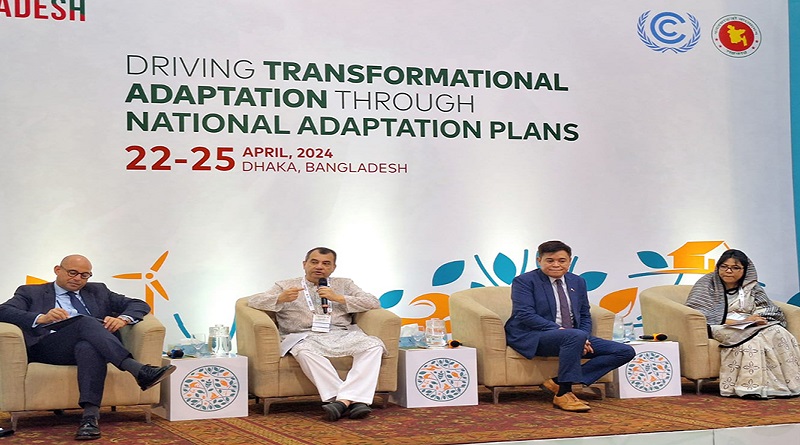NAP Expo 2024: Experts call for new approach to adaptation planning, support
Climate experts meeting in Bangladesh have called for a step change in the way adaptation to climate change is dealt with in terms of planning at national level, the way support is provided, and the variety of sources for support.
More than 500 experts from around the world are attending NAP Expo 2024 in Dhaka, Bangladesh, designed to drive transformational adaptation through national adaptation plans, or NAPs.
At a high-level transformational dialogue this week, UN Climate Change Executive Secretary Simon Stiell flagged the fact that in the 14 years since they were established, only 54 developing countries have produced a NAP.
Unlocking funding for the actions spelled out in them has been a slow process, requiring a shift in the way the plans are designed, and in the approach towards them.
“National adaptation plans should be designed so they can secure finance from as many donors and investors as possible – public, private, and philanthropic sources,” he said. “We need to make NAPs a tool that can bring everyone on board. Every government department, in every country, should feel they own their national plan.
“We must ensure that national adaptation plans become our key tool and reference point. To maximize the flow of finance, NAPs to need to contain more usable, measurable information,” he added.
One country lauded by Stiell and widely recognized as a leader in designing and implementing adaptation plans is the NAP Expo 2024 host country, Bangladesh. Despite Bangladesh experiencing three cyclones in 2023, there was no loss of life due to the storms. This was seen by many as evidence of Bangladesh’s improved resilience.
Bangladesh has 2,000 storm shelters distributed over coastal districts, where people take refuge. And the country has put a major emphasis on nature-based solutions, including the creation of coastal and hill forests that serve as barriers against erosion and flooding.
Particularly important is Bangladesh’s approach to securing finance for adaptation. For example, the Mujib Climate Prosperity Plan launched last year spells out investment in resilient sectors like energy, water, transport, and agriculture, amounting to $90 billion over the next decade and involving multiple multilateral stakeholders. And it signaled a transformed perspective when it comes to the meaning of adaptation and resilience.
Explaining this, Saber Hossain Chowdhury, Bangladesh’s Minister for Environment, Forest and Climate Change said: “We are all working on building resilience in terms of responding to the impacts of climate change. Bangladesh has added another dimension, and that is prosperity. So, how do we move from vulnerability to resilience, to prosperity? We want to transform a high-risk agenda into one that is going to create opportunities in terms of resilience, in terms of creating jobs, in terms of ensuring livelihoods of the people.”
Some key conclusions of the transformational dialogue
Participants at the NAP Expo 2024 high-level transformational dialogue came to several key conclusions regarding what will be needed to effectively step up adaptation, including:
- Future NAPs will need to be designed to tap into the broadest of financing opportunities, going beyond the funds under the UNFCCC.
- The financing landscape and the support ecosystem must embrace NAPs as the main vehicle for supporting climate resilience-building, while also embracing learning by finding solutions and workarounds for current obstacles and challenges faced by developing countries in accessing climate finance.
- Every entity involved in financing adaptation, including NAPs, must embrace innovation through research and development, making use of emerging knowledge and technologies.
- NAPs should build better on the best available science to provide climate risk information to support investment decisions, while also providing the impetus for transformations in development leading to a resilient, sustainable future, ensuring medium- and long-term prosperity.
- NAPs should enhance how it addresses the needs of vulnerable groups, communities and ecosystems, including in relation to gender, social and economic inclusion.
- NAPs should more fully act as a convenor of diverse stakeholders at national and global levels to co-produce comprehensive, multi-sectoral solutions.
Climate risk as an opportunity for transformation and innovation
“We have to be true to ourselves and accept that things could be better in terms of progress on NAPs. This way we can open up to finding ways to ensure good progress,” Stiell said, urging the global community to see risk as an opportunity for transformation, innovation, and a fresh impetus to private sector action.
Stiell emphasized that whilst he hoped to see the kinds of plans that will attract financing from all available sources, any new or innovative sources of finance for adaptation “should not further disadvantage vulnerable countries by increasing their debt burden in any way.”
Finally, the UN’s top climate change official pointed out that prioritizing adaptation is the only way to develop resilience for every nation against growing climate impacts, not least in the age of the globalized economy.
“Resilience building is critically urgent to protect our societies and our economies. Take the supply chains that all economies depend on. We have just seen what supply chain disruptions flowing on from COVID did to inflation and businesses. We can be sure that these disruptions and inflationary impacts will get dramatically worse without bolder climate action.”
NAP Expo 2024 was co-organized by UN Climate Change and the government of Bangladesh. It was the first NAP Expo to be held in a least developed country in the 11 years since NAP Expos began. The event hosted experts and representatives from national and sub-national governments, funding agencies including the Green Climate Fund, the Global Environment Facility and the Adaptation Fund, UN and other international organizations, bilateral and multilateral agencies, civil society representatives, regional centers and networks, the private sector and academia. The theme of this year’s NAP Expo is Driving Transformational Adaptation through National Adaptation Plans




